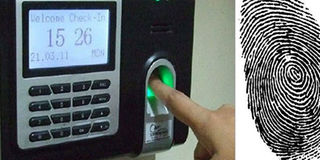Biometric scheme vital but will government enforce it?

The gadgets will first be installed in schools and hospitals to monitor teachers and health workers’ attendance, but will be rolled out to other sectors later. COURTESY PHOTO
What you need to know:
- The issue: Biometric scheme
- Our view: The biometric system should not be another stillbirth like the employment-on-contract pronouncement.
The government is introducing a biometric system in public facilities to check absenteeism of civil servants at their duty stations and improve performance.
While receiving the biometric equipment from DFID on Tuesday, the head of the Delivery Unit in the Office of the Prime Minister (OPM), Dr Ezra Suruma, said the gadgets will first be installed in schools and hospitals to monitor teachers and health workers’ attendance, but will be rolled out to other sectors later.
Dr Suruma said civil servants will be paid for the number of days worked, not a guaranteed monthly salary as is currently the case. This is a good move. If it is enforced to the letter, it will significantly improve performance of public servants in government facilities and save government from paying for services not rendered. It will also lessen absenteeism, encourage and reward performance and punish laziness or non-performance.
The DFID must be commended for providing this vital equipment for improving service delivery in the public sector, where civil servants have cheated both the citizens and government too much for too long. We welcome more DFID support to government towards enhancing service delivery in the public sector.
The biometric equipment will initially be installed in 22 districts in eastern region, but will gradually be rolled out to other districts. We call upon government to ensure the equipment is installed in all the districts across the country as soon as possible to help our long-deprived citizens get better service.
In eastern region where the scheme has been piloted, it is already bearing good results with declining absenteeism and improved performance among government workers.
However, as much as the biometric system is vital in checking absenteeism at work, the gadgets alone, without committed personnel for supervision and monitoring, will amount to nothing.
Implementation is the arduous challenge. In the past, government has announced noble–sounding and exciting policies to improve service delivery only to be abandoned or neglected shortly after the declaration.
About five years ago, the OPM announced a similar policy to improve performance of government workers. It declared that civil servants would no longer be employed on permanent basis, but on contract renewable basing on performance. However this policy died as soon as it was announced. In other words, it suffered a stillbirth.
We hope this time round, the government is more serious on using the biometric system to monitor public servants attendance and enforce penalties against the offenders. The biometric system should not be another stillbirth like the employment-on-contract pronouncement.




